Fantasy fiction is best known for its giant, door-stopping series that come in trilogies or longer. Of course, not everyone wants to embark on a ten-book project. And even if you love series, sometimes it’s nice to read a standalone story that provides a satisfying resolution within a single book. With that in mind, I’ve set out to provide a list of ten fantasy stories that have all the thrills of a series but stand alone as a single volume.
The first thing I should note is that this list is for novel-length works only, although there are tons of great fantasy novellas out there. I also decided that I was only going to list one book by each individual author, which meant making some tough decisions (especially when it comes to Neil Gaiman’s writing). Finally, I wanted each of these books to be a true standalone with no sequel on the way. That means no Goblin Emperor or Elantris! Even with those limitations, I found plenty of standalone fantasy stories I love—enough that I struggled to cap this list at ten. Shout out to some stories that almost made it on here: The Lions of Al-Rassan by Guy Gavriel Kay, Certain Dark Things by Silvia Moreno-Garcia, Roses and Rot by Kat Howard, and The Steel Seraglio by Linda, Louise, and Mike Carey.
Some of the entries on this list are well-known bestsellers; others, not as much. I hope that everyone who reads this will find at least one book that’s new to them.
The Last Unicorn by Peter S. Beagle
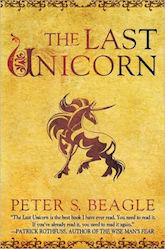 When I set out to create this list, I knew The Last Unicorn had to be on it—it is my favorite of all classic fantasy novels. With its lyrical writing, The Last Unicorn sweeps me away into its timeless story of a unicorn who fears she may be the last of her kind and sets out on a journey to find others. While Peter S. Beagle has returned to this world with some short stories and a novelette, The Last Unicorn remains a standalone novel.
When I set out to create this list, I knew The Last Unicorn had to be on it—it is my favorite of all classic fantasy novels. With its lyrical writing, The Last Unicorn sweeps me away into its timeless story of a unicorn who fears she may be the last of her kind and sets out on a journey to find others. While Peter S. Beagle has returned to this world with some short stories and a novelette, The Last Unicorn remains a standalone novel.
Jonathan Strange & Mr Norrell by Susanna Clarke
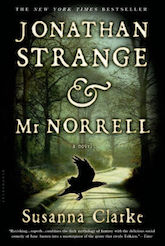 Jonathan Strange & Mr Norrell is a modern-day classic—one that’s even received an adaptation from the BBC. The story follows two Regency-era magicians who are prophesized to bring magic back to England. The two start out as mentor and student but are soon at odds, and their rivalry threatens to destroy them. Jonathan Strange & Mr Norrell is a huge tome of a novel, but I enjoyed every moment of it. Clarke writes in the style of nineteenth-century authors such as Jane Austen and Charles Dickens, and her narration brims with sly humor. The use of footnotes is simply delightful, with asides that range from commentary on the characters and events to stories-within-stories. It’s a fiendishly clever novel that fully deserves its high renown.
Jonathan Strange & Mr Norrell is a modern-day classic—one that’s even received an adaptation from the BBC. The story follows two Regency-era magicians who are prophesized to bring magic back to England. The two start out as mentor and student but are soon at odds, and their rivalry threatens to destroy them. Jonathan Strange & Mr Norrell is a huge tome of a novel, but I enjoyed every moment of it. Clarke writes in the style of nineteenth-century authors such as Jane Austen and Charles Dickens, and her narration brims with sly humor. The use of footnotes is simply delightful, with asides that range from commentary on the characters and events to stories-within-stories. It’s a fiendishly clever novel that fully deserves its high renown.
The Devourers by Indra Das
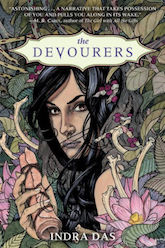 I nearly quit reading The Devourers early on, but I’m so glad I didn’t. In modern-day Kolkata, India, Alok encounters a man who claims to be half werewolf and who has a set of mysterious texts he needs transcribed. From these texts arises the dark story of shapeshifters in Mughal India. The Devourers centers around the rape of a human woman by a male shapeshifter, and the brutality of that section had me struggling with the story. But then the narration is handed squarely to the woman, Cyrah, whose anger and determination make her voice unforgettable. The Devourers is a story about monsters and the monstrous ways we can treat each other, but it’s also a story that insists on holding its characters accountable for their actions. Finally, The Devourers happens to be one of the queerest stories I’ve ever read, embracing fluidity of gender and sexuality.
I nearly quit reading The Devourers early on, but I’m so glad I didn’t. In modern-day Kolkata, India, Alok encounters a man who claims to be half werewolf and who has a set of mysterious texts he needs transcribed. From these texts arises the dark story of shapeshifters in Mughal India. The Devourers centers around the rape of a human woman by a male shapeshifter, and the brutality of that section had me struggling with the story. But then the narration is handed squarely to the woman, Cyrah, whose anger and determination make her voice unforgettable. The Devourers is a story about monsters and the monstrous ways we can treat each other, but it’s also a story that insists on holding its characters accountable for their actions. Finally, The Devourers happens to be one of the queerest stories I’ve ever read, embracing fluidity of gender and sexuality.
Good Omens by Neil Gaiman and Terry Pratchett
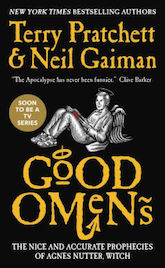 Terry Pratchett and Neil Gaiman are both fantastic authors whose work sparkles with humor and humanity. I’m sure most people reading this are familiar with both Gaiman and Pratchett, and I have no doubt that Gaiman’s American Gods makes many people’s list of best standalone fantasy novels. But the authorial team-up of Gaiman and Pratchett is a match made in literary heaven, and as a result, I’ve read Good Omens more times than I can count. The end of the world is nigh, and someone’s misplaced the Antichrist. Can you imagine a more hilarious take on the end of the world? I sure can’t.
Terry Pratchett and Neil Gaiman are both fantastic authors whose work sparkles with humor and humanity. I’m sure most people reading this are familiar with both Gaiman and Pratchett, and I have no doubt that Gaiman’s American Gods makes many people’s list of best standalone fantasy novels. But the authorial team-up of Gaiman and Pratchett is a match made in literary heaven, and as a result, I’ve read Good Omens more times than I can count. The end of the world is nigh, and someone’s misplaced the Antichrist. Can you imagine a more hilarious take on the end of the world? I sure can’t.
The Forgotten Beasts of Eld by Patricia A. McKillip
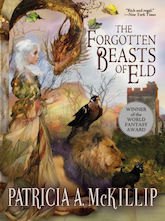 Sadly, I had never read this fantasy classic until last year. The Forgotten Beasts of Eld tells the tale of Sybel, an isolated wizard who lives alone with her menagerie of powerful and magical creatures. Then Sybel finds herself raising the secret son of a king, and her quiet life collides with the world of powerful men. The Forgotten Beasts of Eld explores themes of forgiveness, revenge, love, and power. It’s also exquisitely written and has the feel of an original fairy tale, with all the emotional strength of the very best fables and legends.
Sadly, I had never read this fantasy classic until last year. The Forgotten Beasts of Eld tells the tale of Sybel, an isolated wizard who lives alone with her menagerie of powerful and magical creatures. Then Sybel finds herself raising the secret son of a king, and her quiet life collides with the world of powerful men. The Forgotten Beasts of Eld explores themes of forgiveness, revenge, love, and power. It’s also exquisitely written and has the feel of an original fairy tale, with all the emotional strength of the very best fables and legends.
Sunshine by Robin McKinley
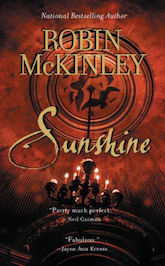 Sunshine is one of my all-time favorite books, and I go back to it whenever I need a comfort read. Sunshine needs a break from working at the family bakery and heads out to her grandma’s cabin in the woods. Alone. At night. Which is unwise in a world where humans are barely hanging on in the fight against vampires… I don’t know what I love most about Sunshine, because there’s just so much about it that’s great. McKinley writes Sunshine’s narration in the first person, unleashing a stream of consciousness that’s both hilarious and deeply personal. Perhaps because of that, we see the world she creates only in glimpses, but you know there’s plenty more going on beneath the surface. Sunshine herself is a heroine both flawed and courageous who’s only beginning to learn the extent of her own power.
Sunshine is one of my all-time favorite books, and I go back to it whenever I need a comfort read. Sunshine needs a break from working at the family bakery and heads out to her grandma’s cabin in the woods. Alone. At night. Which is unwise in a world where humans are barely hanging on in the fight against vampires… I don’t know what I love most about Sunshine, because there’s just so much about it that’s great. McKinley writes Sunshine’s narration in the first person, unleashing a stream of consciousness that’s both hilarious and deeply personal. Perhaps because of that, we see the world she creates only in glimpses, but you know there’s plenty more going on beneath the surface. Sunshine herself is a heroine both flawed and courageous who’s only beginning to learn the extent of her own power.
Under the Pendulum Sun by Jeannette Ng
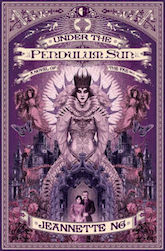 What happens when Christian missionaries go to fairyland to convert the fae? It could be the start of a comedy, but in the highly capable hands of Jeannette Ng, it becomes a haunting Gothic fantasy tale. Catherine Helston pursues her missionary brother to the fairy realm of Arcadia and encounters a world where everything she takes for granted, from physics to faith, is questioned. Under the Pendulum Sun is a disconcerting read, with Catherine constantly in peril of falling under the sway of Arcadia’s insanity. Intricate and thoughtful, Under the Pendulum Sun is a book whose depths I’ve yet to fully explore.
What happens when Christian missionaries go to fairyland to convert the fae? It could be the start of a comedy, but in the highly capable hands of Jeannette Ng, it becomes a haunting Gothic fantasy tale. Catherine Helston pursues her missionary brother to the fairy realm of Arcadia and encounters a world where everything she takes for granted, from physics to faith, is questioned. Under the Pendulum Sun is a disconcerting read, with Catherine constantly in peril of falling under the sway of Arcadia’s insanity. Intricate and thoughtful, Under the Pendulum Sun is a book whose depths I’ve yet to fully explore.
Ariah by B.R. Sanders
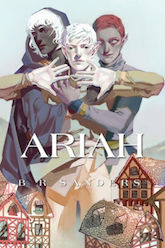 After reading Foz Meadows’ glowing review, I rushed to find a copy of Ariah, a coming-of-age story that’s a spiritual sibling to The Goblin Emperor. Ariah did not disappoint. I immediately fell under the spell of this immersive story about home, love, identity, and family. In this intensely character-focused novel, the young elf Ariah is a shaper, with the ability to feel others’ emotions…but Ariah often gets so lost in the feelings of others that he loses himself. Over the course of the story, Ariah struggles with himself, his place in society, and his growing knowledge of both the complexity and injustice of the world he lives in.
After reading Foz Meadows’ glowing review, I rushed to find a copy of Ariah, a coming-of-age story that’s a spiritual sibling to The Goblin Emperor. Ariah did not disappoint. I immediately fell under the spell of this immersive story about home, love, identity, and family. In this intensely character-focused novel, the young elf Ariah is a shaper, with the ability to feel others’ emotions…but Ariah often gets so lost in the feelings of others that he loses himself. Over the course of the story, Ariah struggles with himself, his place in society, and his growing knowledge of both the complexity and injustice of the world he lives in.
Iron Cast by Destiny Soria
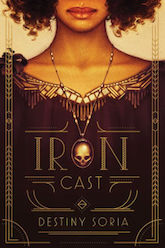 I’ve read quite a few books where magic is tied to artistic creation, but the young adult novel Iron Cast outshines all the rest. This Prohibition era-inspired fantasy imagines a world where certain people can use the arts to cast magic but all acts of magic are banned. Best friends Ada and Corinne perform at an illegal club, a sort of magical speakeasy, but also run cons to make ends meet. When Ada gets arrested and confined to an asylum, it’s only the beginning of the duo’s troubles. Iron Cast presents a luscious setting and an emotionally-laden plot that kept me on the edge of my seat. Perhaps most of all, I adore Iron Cast’s focus on female friendship, something which can be all too scarce in fantasy novels.
I’ve read quite a few books where magic is tied to artistic creation, but the young adult novel Iron Cast outshines all the rest. This Prohibition era-inspired fantasy imagines a world where certain people can use the arts to cast magic but all acts of magic are banned. Best friends Ada and Corinne perform at an illegal club, a sort of magical speakeasy, but also run cons to make ends meet. When Ada gets arrested and confined to an asylum, it’s only the beginning of the duo’s troubles. Iron Cast presents a luscious setting and an emotionally-laden plot that kept me on the edge of my seat. Perhaps most of all, I adore Iron Cast’s focus on female friendship, something which can be all too scarce in fantasy novels.
City of Bones by Martha Wells
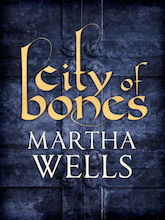 Martha Wells has recently entered the spotlight with her delightful, award-winning science fiction novella All Systems Red, but she’s also got a fabulous backlist. City of Bones wars with Death of the Necromancer for my favorite Martha Wells novel, but City of Bones undoubtedly wins the place of “Best Standalone by Martha Wells.” The post-apocalyptic fantasy world displays the author’s characteristic imagination, and the plot never fails to keep me gripped to the page. Khat, our protagonist, works as a relics trader and treasure hunter to keep himself afloat in a city where he’s a non-citizen. When an expedition hires him on as a guide, he finds himself involved in a search for a relic of unprecedented power.
Martha Wells has recently entered the spotlight with her delightful, award-winning science fiction novella All Systems Red, but she’s also got a fabulous backlist. City of Bones wars with Death of the Necromancer for my favorite Martha Wells novel, but City of Bones undoubtedly wins the place of “Best Standalone by Martha Wells.” The post-apocalyptic fantasy world displays the author’s characteristic imagination, and the plot never fails to keep me gripped to the page. Khat, our protagonist, works as a relics trader and treasure hunter to keep himself afloat in a city where he’s a non-citizen. When an expedition hires him on as a guide, he finds himself involved in a search for a relic of unprecedented power.
Sarah Waites has been reading science fiction and fantasy for as long as she can remember. Her book blog, The Illustrated Page, reviews SFF books through a queer feminist lens. You can follow her on Twitter.










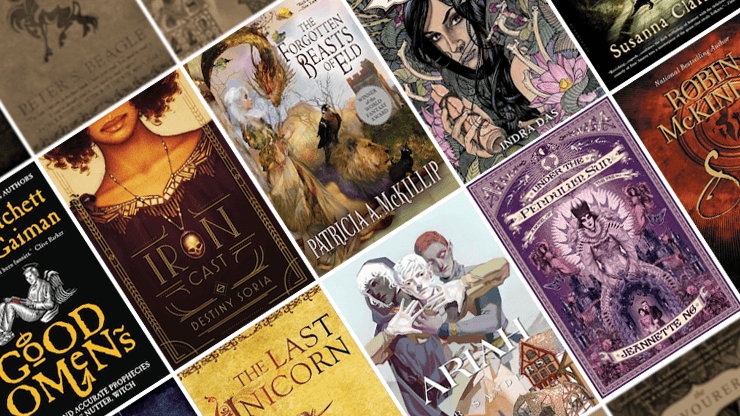
I couldn’t get into Jonathan Strange & Mr Norrell. I tried 3 times and only made it half way.
The War of Flowers by Tad Williams is a pretty good standalone. Also, pretty much anything by Guy Gavriel Kay is pretty great. Tigana is one his best ones.
Hang on. Goblin Emperor sequel? How did I miss this news? Yippee!! Cannot wait.
“The Dragon Waiting” or “The Princes of the Air” or, really, anything John M Ford wrote. He was the master of the standalone fantasy novel.
Some good choices. Loved the ones I’ve read (Beagle, Clarke, Das, Gaiman & Pratchett), and Under the Pendulum Sun and Ariah sound interesting.
An addition: Spiderlight by Adrian Tchaikovsky. A standalone and even relatively short. And with spiders.
The Lions of Al-Rassan by Guy Gavriel Kay is one of my all-time favorites! I have read and appreciated Good Omens and The Devourers. But must get to the others on the list! Thanks for more reading material :)
Devourers is a story about monsters and the monstrous ways we can treat each other, but it’s also a story that insists on holding its characters accountable for their actions.
I’m afraid I have to respectfully disagree here. The impression I got from The Devourers is that it’s firmly on the side of the monsters. The werewolves are superior to us mere humans, and if they have have to kill humans for food, why, their victims are mostly just NPCs and no one cares. If you hang out with the werewolves and they don’t eat you, you are being an independent and oh-so-special snowflake who is Not Like All The Other Girls Humans, and if you ask about becoming one, the fact that Werewolf-You would have to kill people and eat them is a momentary pang of conscience that can be easily dismissed. The present-day protagonist would be honored if his monster boyfriend were to decide to kill and eat him someday and wear his shape.
I have to give them some credit for emphasizing that obsession does not equal love. But on the whole, morality-wise, The Devourers is basically Twilight with better writing and explicit sex.
Tailchaser’s Song is a good standalone fantasy, especially if you like Watership Down. Which also, I guess, qualifies.
Great list, will check out the Forgotten Beasts of Eld!
I’ve read six of these, and they’re all spectacularly good – I look forward to reading the rest if they’re in this company.
Under the Pendulum Sun was one of the most original and fascinating new books I read this year, and I’m looking forward to whatever Jeannette Ng writes next.
I’m not sure that the next Katherine Addison book is, strictly speaking, a sequel to The Goblin Emperor. From what I understand, it’s a story set in that world during Maia’s reign, so I wouldn’t call it a sequel, per se. (Either way, so can’t wait…)
The Circus of Dr. Lao (1935) by Charles G. Finney and The Unconquered Country (1986) by Geoff Ryman are the two I always recommend. Neither is like any other book I have ever read.
Hope Mirrlees: Lud in the Mist
John Crowley: Little Big
@1 With you there on Strange and Norrell. I think it is one for people who like Austen et al already, and want to try that genre with some fantasy. It is a bold experiment, but it is not really for the mass audience (despite the hype).
How do we feel about fantasy books that were originally written as standalones but later got spun off into series? Or Series which are mainly composed of standalone novels with only a common world setting? I’m thinking of Mercedes Lackeys SERRAted Edge books, which you can read individually and while they share a setting, they all tell their own story? Or David Gemmell’s non-Druss Drenai novels, all of whom have their own hero and villain and self-contained story?
Under the Pendulum Sun is a bit of an homage to Jane Eyre, and yet is entirely original. The book is truly disconcerting even while at times it feels familiar. It’s very good at what it sets out to do, which you might guess has a bit to do with insanity.
I have to recommend two I’ve recently (and belatedly) discovered: One Night in the Lonesome October by Roger Zelazny, told from the point of view of a dog whose master is trying to avert a magical apocalypse at Halloween, and the Face in the Frost, an adult novel by YA writer John Bellairs, which has an amazing dreamlike narrative.
Okay, if it’s on a list with Sunshine, I will buy it. (Grabs Pendulum Sun)
Lois McMaster Bujold’s The Curse of Chalion is a perfectly good standalone novel, and I’ve reread it several times as such, feeling no corresponding need to reread any of its sequels. (by the same rule, one of my answers to “What’s a good standalone science fiction novel?” is “Dune.”)
btw, I’m #TeamStrangeAndNorrell, but then I also do have to put my hand up to admitting I like Austen and Patrick O’Brian, so guilty as charged.
@17: Lois McMaster Bujold’s The Curse of Chalion is a perfectly good standalone novel, and I’ve reread it several times as such, feeling no corresponding need to reread any of its sequels.
You could say the same thing about the sequel: Paladin of Souls can be read as a standalone, too.
I still prefer to think of Curse and Paladin as a unit. Ista’s “madness” in the first book takes on added… immediacy when you see it from her point of view, and it makes the pain she’s still in at the end of Curse near unbearable if you stop there.
(Yes, I adore those two novels to pieces. Bujold’s best books in that world by far).
@10: I don’t want to sound deranged but WHERE DID YOU READ THAT? PRETTY PLEASE????
I love everything Sarah Monette has written, and I thought nothing could compete with Kyle Murchison Booth’s reluctant adventures, or Felix and Mildmay’s odyssey, but then The Goblin Emperor came out…
Re Strange and Norrell:
I agree that it’s probably not a book for everyone. It takes its time, and for its first third or even half sort of reads like a Dickens parody, with fairies. I confess that what kept me going were those marvelous, amusing, insidious footnotes. And then it gels, and grabs you, and does not let go.
I even have a feeling that the ending is a bit rushed. I would have loved a couple of hundred pages more, just to tie all loose ends. I would like to have read more about Lady Pole’s life as an independent woman, for instance, and also about Stephen’s deeds in Lost Hope –I bet one of his first mandates as a king would be to change the name to Hope Regained or something…
@1 & 13: I’m beyond relieved to hear other people had a similar experience with JS & MN. I thought the problem was me. But I almost never quit a book, and I’ve quit that book twice.
John Barnes said he’s going to put a book before and a book after One for the Morning Glory, but that was at least ten years ago. Till he produces–and I’d love it if he decides to!–this one belongs on the list.
Naomi Novik, Spinning Silver and Uprooted, each a standalone, both works of genius
Ursula LeGuin, The Lathe of Heaven (just re-read it!)
Terry Pratchett, The Amazing Maurice and His Educated Rodents (yes, it’s part of Dicsworld, but it is a standalone novel and it’s brilliant)
Natasha Pulley, The Watchmaker of Filigree Street
Wow. I found Jonathan Strange and Pendulum Sun unreadable or nearly so.
The Kay is part of a series. It might not have a direct sequel, but it isn’t absolutely stand-alone.
In no particular order, a list of some of my very favorite stand-alone fantasy novels (several from folk better known for their series work):
Matt Ruff’s Fool on the Hill
Charles de Lint’s Moonheart
Diane Duane’s Stealing the Elf-King’s Roses
Susan Cooper’s King of Shadows
Judith Tarr’s A Wind in Cairo
Just to add to the debate, I loved Jonathan Strange & Mr Norrell, but I can definitely see why many people would not. It seems to be one of those books that elicit such divided opinions.
A vote for another Ursula LeGuin semi forgotten gem: The Beginning Place.
Under the Pendulum Sun is a magnificent piece of Christian-flavored grimdark. The Christian flavor was a little too strong for me sometimes, but Jeannette Ng’s sumptuous, intelligent, tight prose is worth any price of admission.
And I just found a reference to the Goblin Emperor sequel: https://www.goodreads.com/book/show/41302953-untitled
Most of Zelazny outside Amber (which I never took to) is like this. Jack of Shadows and especially Lord of Light certainly qualify as excellent stand-alones; Creatures of Light and Darkness was too weird for me, but perhaps I should try again. And of course Le Guin’s novels other than Earthsea and the Western Shore are not really series: the Hainish stories have at most a common background which isn’t even very consistent from book to book.
I’d be really skeptical about anyone saying a series novel works as a standalone, unless it’s both the first in the series and not originally set up to continue (“first in a series!” in the cover blurb is a bit of a giveaway). I get that people who like a series like the individual books, but are they the best judges of whether a book stands alone, or are they just not realising how much of the other books they’re bringing to their enjoyment?
@30 The Curse of Chalion works because it’s the first book in the setting and the main characters are only referenced (I’m pretty sure they never appear “on screen” again) in the only book that takes place later in the setting. While it’s first, it’s not first in a series. Paladin of Souls is a good example since it’s not part of the same story as Curse (like it would be a trilogy) but still has a lot of references to the first book. The third novel in the setting, The Hallowed Hunt is completely separate and can be read as a standalone, though.
I’m glad you included City of Bones. It’s one of my favorite Martha Wells novels. I also second the recommendation of Moonheart by Charles de Lint. A lovely book rhat I’ve read more times than I can count.
I think there’s a bit of confusion here about what constitutes a “standalone” novel, in that it’s first defined (quite sensibly, I think) as “a standalone story that provides a satisfying resolution within a single book”, and then it’s redefined as “a true standalone with no sequel on the way”.
Would the fact that Susanna Clarke announced — back in 2004 — that she was working on a sequel to Jonathan Strange & Mr Norrell then disqualify that book, even if she hasn’t been able to finish the sequel so far? (Does the existence of The Ladies of Grace Adieu and Other Stories disqualify Jonathan Strange?)
I’m wondering in part because the discussion of which Martha Wells novel to list implies that Death of the Necromancer and City of Bones are equally good, but the latter is “undoubtedly” the “Best Standalone” novel. Which is odd, because Death of the Necromancer is very much a standalone novel — and is listed as such on Wells’s web site.
(Of course, I wholeheartedly approve of recommending that people read Martha Wells; my only substantive comment would be that I think Wheel of the Infinite is even better than City of Bones…)
The answer to the Susanna Clarke question is “obviously not”. Same with the Bujold example, and the Herbert in sf, and Vinge’s A Fire Upon The Deep. In these cases, sequels were conceived, or at the least greenlighted, following the success of the book, but the book was written either with no thought of a sequel, or at the least with the thought that a sequel may never interest a publisher, so the book had better stand up properly all on its own.
It depends on the meaning of “on the way”. If the novel contains the seeds of resolution that are “on the way”, it’s not standing alone, it’s declaring itself part of a series, as surely as if that was in the blurb.
A final clue is in the article title: tired of series? The satisfied reader of a standalone must not feel they’re being baited with a sequel.
A really hazardous part of declaring any subsequent book “separate enough to stand alone”, if you’re a fan of the series, is that in books after the first, the writer very sensibly reins back on the exposition that was necessary in a unique, jewel-like, introduction to the world and its characters, but the devoted reader might not notice they’re bringing their knowledge to the new book. They then say “hey, read this. Sure, it’s part of a series, but it stands fine by itself.”
I’ve been unknowingly misled by innocent series fans in just this way: I go back to them and say “I don’t get this part” and they say “oh, that was a reference” or “oh, that part of the universe was explained very thoroughly in the first book”. Well then, its not standing very alone, is it? The original, first, book is much more likely to be immune to this effect.
Del @@@@@ 34:
The answer to the Susanna Clarke question is “obviously not”.
I agree with you, in fact. (And, I’ll note, Sarah Waites does intend that “standalone” novels include cases where the author had written other stores in the same setting. In addition to Jonathan Strange & Mr Norrell, there’s The Last Unicorn (“While Peter S. Beagle has returned to this world with some short stories and a novelette, The Last Unicorn remains a standalone novel.”).
For what it’s worth, this Reddit thread discusses the announcement of the “sequel” for The Goblin Emperor, which may not be more of an “in the same setting, but not a direct continuation” thing (“It is not a direct sequel, it does take place in Maia’s reign (so Maia is not viewpoint character)”).
A really hazardous part of declaring any subsequent book “separate enough to stand alone”, if you’re a fan of the series, is that in books after the first, the writer very sensibly reins back on the exposition that was necessary in a unique, jewel-like, introduction to the world and its characters …
That’s true if the “subsequent” books are continuations of the same story, or use precisely the same setting, or the same characters. I would argue this isn’t really true for things like Death of the Necromancer, which is set hundreds of years later than The Element of Fire, and even though it’s the same city, the society has changed significantly. (Arguably, the underlying, I-assume-you’re-already-familiar-with-this background for Death of the Necromancer is late 19th Century British and French urban society and detective fiction.)
Carl @@@@@ 24:
The Kay is part of a series. It might not have a direct sequel, but it isn’t absolutely stand-alone.
The Lions of Al-Rassan is not a continuation of a previous novel by Kay. It does not have a sequel. None of the characters, so far as I know, appear in any other of Kay’s books. It is a standalone novel. It doesn’t make sense to say it’s part of a series (for one thing, “series” implies a sequence).
C.J. Cherryh’s The Paladin is a fine little standalone novel.
#33-#35: A further difficulty arises in that not all series are of the same character. Until relatively recently, the great majority of “series” works in the mystery genre were more or less episodic in nature. That is, while each separate volume might feature the series’ primary character/sleuth as protagonist, there were few if any plot threads connecting one book to the next so that one could read any book in the series in any order (Nancy Drew, Miss Marple, Perry Mason, Jessica Fletcher, etc.). Nowadays, though, this has changed markedly, as most “cozy” mystery series now include some degree of underlying continuity, often in the form of a romance that takes anywhere from three to six books to fully germinate.
Now there are (or at least were) episodic fantasy series as well — mostly lighter fare, such as Robert Asprin’s “Myth Adventures” novels, Randall Garrett’s Lord Darcy stories, and so forth. And there are writers who’ve done stand-alone books within the context of a larger series setting (one notable example is Mercedes Lackey’s By the Sword, which is a free-standing novel set in the world of her ongoing Valdemar cycle). But the trend seems to be toward not just series, but interlinked series (see particularly Marshall Ryan Maresca’s tales of Maradaine, currently incorporating no less than four nominally independent sub-series).
There are, in fact, a couple of short follow-up works linked to de Lint’s Moonheart, but I was trying to steer clear of borderline cases when I made my list above. Which is why I did not mention Barry Hughart’s Bridge of Birds in that earlier post — it was originally published as a free-standing novel, and indeed the two further volumes that followed appeared long afterward and from a different publisher, but at this point the Master Li books are mostly discussed as a group.
John C. Bunnell@37
With regards to “Moonheart”, there’s also the novel-length sequel “Spiritwalk”. And the Tamson House stories are connected to the Newford stories. However, most of the stories in the Newford etc. ficverse can, I think, be read as standalones. There are connections that add a bit of reonance, but generally all of the background you actually NEED for each story is contained within the story itself.
#35: conceded, the Kay fantasy novels aren’t a series except for the ones published as trilogy or duology. They’re connected stories that share elements, but not a series.
Thinking about the premise, I can argue that The Lord of the Rings fits this topic. Tolkien originally meant it as one very long book.
Another plug here for Little, Big.
I have to object to so many assertions that “if you like Jane Austen, you’ll like JS & MN.” I adore the first and didn’t like the second. Austen did not write adventures, life-threatening events, stories that cover lots of time and space, or magic.
A similarity of setting is never enough to say, “you’ll like this too.” My intolerance for violence and hatred in stories keeps me away from most modern novels.
@41, I interpreted that as “necessary, but not sufficient”. What they were saying, which I admitted to, was “if you don’t like Austen, you probably won’t like this.”
The two statements aren’t equivalent, because that would exclude the middle, which is you (liked Austen, didn’t like Clarke: your cat had the required four legs, but still wasn’t a dog)
Do you know who writes excellent stand-alone novels? Helen Oyeyemi. The Icarus Girl is a must. Definitely get through her others as well.
Seconding John C. Bunnell @25 that Stealing the Elf-King’s Roses is a wonderful read. Also agree with PeterErwin @33 that Wheel of the Infinite is even better than City of Bones, although I enjoy and have reread them both multiple times.
In November Sarah Monette/Katherine Addison sent her Patreon subscribers a short snippet from the beginning of the Goblin Emperor … sequel is not exactly the right word. Same world, slight character overlap, not a continuation of the previous story. The working title is The Witness for the Dead and the main character is Mer Celehar. I had read elsewhere, I think, that it’s a murder mystery.
Has anyone suggested The Broken Sword by Pohl Anderson?
“Pohl Anderson” is either the most fortunate typo I’ve seen in months, or an interesting fannish alt history.
@@@@@ 46, A typo, I’m afraid, though if it sparks a good alt history idea then I don’t regret it. (I’m reminded of an old facetious Asimov quip to the effect that “I don’t read fancy authors like Franz Dunsany or Lord Kafka.”)
Anything Robin McKinley writes is amazing. Most of her books are shelved under YA, but I discovered them as an adult and enjoy them immensely.
another great stand alone is The Night Circus by Erin Morgenstern. Just beautifully written and very unique.
Tigana – by Guy Gavriel Kay. Simply the best single volume high-fantasy I’ve ever read.
I know you limited yourself to one book per author, but I like Stardust by Neil Gaiman and The Book of Atrix Wolfe by Patricia A. McKillip as much or more than the books you listed.
Count Zero, if you liked The Face and the Frost, you should know that a fragment (about a third) of Dolphin Cross, Bellairs’ proposed sequel to The Face and the Frost was included in Magic Mirrors, a NESFA Press hardcover collecting Bellairs’ other fantasies for adults. The abrupt ending was frustrating (it is a fragment after all), but it was fun to spend a little more time in that world.
@1, 13, 20, 34, et seq:
I loved Jonathan Strange & Mr. Norrell and have read it several times but while I keep trying to read Jane Austen (at intervals of a decade or so) I’m still bouncing off, so I’m a counter-example to the Austen theory. I can’t remember who, but I read a perceptive comment by someone to the effect that Clarke is not actually writing in a 19th century style, she’s writing in the style of what we think 19th c writing should be like.
I’ve wondered if perhaps the great divide between JS&MN fans and non-fans is partly influenced by personal reading speed. It is a huge book, and even its fans admit it moves very slowly in the beginning. I’m an exceptionally fast reader, so while not a lot appears to be happening in the long slow build-up during the first third or so of the book, there were enough interesting things going on at a rate that kept me involved, and then once the amount of magic started accelerating exponentially I was completely wowed. If I were to read at a more typical rate, after investing a week or so and reading the equivalent of a short novel with nothing dramatic yet, I could see it would be tempting to just say forget about it and chuck it. (Of course now somebody with a world record speed-reading medal will jump in to tell me I’m wrong and they hated it.)
Ashgrove @28: I don’t think of Pendulum Sun as a Christian novel despite its missionary protagonists (and if Jeannette Ng is Christian, she’s not particularly vocal about it) but I think part of what made it so fascinating and compelling for me is that it takes the VIctorians’ approaches and attitudes to Christianity so utterly seriously, and follows the logic of what they might have reasoned about their setting in Faerie. I found the characters’ conclusions in the end utterly convincing in the sense of “Oh yes, of course this is exactly what a Victorian missionary would have concluded.” And then as you say, there’s the gorgeous prose – sumptuous is right. (BTW, she is great to follow on Twitter – she writes a number of fascinating and intelligent threads on a variety of topics.)
hoopmanjh @36: Oh yes, The Paladin is one of my favorite comfort re-reads, especially if I’m sick or depressed. I think Jo Walton said something similar about it.
I’m continually recommending Silvia Moreno-Garcia, and most everything is standalone.
Signal to Noise – magical realism with music
Certain Dark Things – vampire noir
The Beautiful Ones – novel of manners, with telekinesis
Prime Meridian – near future existential crisis
Very much looking forward to Gods of Jade & Shadow, with Mayan Gods in 1920s Mexico.
Glenda Larke Havenstar
THANK YOU SO MUCH for including Sunshine on this list! It’s been one of my favorites since my best friend and i were devouring everything Robin McKinley in middle school. The punchy modern writing style, the story of an older-than-teens woman discovering her own magic powers, the vampires that are not traditional vampires and not sparkly ones either, the sound effects….it’s a great book and it’s never gotten the attention it deserves. I hope more people pick it up!
Seconding Naomi Novik’s Spinning Silver especially hard; far and away one of the best books I’ve read in the past 10 years. Wonderful characters, gorgeous prose, solid plotting, and all threaded through with glints of many tales.
LOVE that Sunshine is on this list! Most of McKinley’s books are standalone. Even The Blue Sword and The Hero and The Crown feel like standalone novels–same world, centuries apart. It’s my opinion that everyone should read her novels, but those who enjoy fantasy with strong, complex, real female characters will especially love them.
Thank you for the other great ideas! There’s a few I haven’t come across yet, and I can’t wait to try them out.
Riding the Serpent’s Back by Keith Brooke is quite good by a little known English science fiction and fantasy author.
Not a Jane Austen fan and I loved Strange And Norrell. I couldn’t get into it either my first time reading but I tried the audiobook when I was doing quite a bit of driving for work and ended up loving it. Yes the first third or so can be difficult but it’s worth it. I Read the paperback a few years after listening to the audiobook and it was very enjoyable after being familiar with all the context. Can’t wait for the sequel hopefully it actually comes out.
The book that Martha Wells wrote that first got me was her The Element Of Fire, it is one of her best as far as I’m concerned. I have always wanted her to revisit the characters and world of this book and continue its story with more more more, alas not to be as far as I know and is just a fantastic stand alone novel.
Chime by Franny Billingsley
and yes, I love all of Martha Wells’ standalones as well as her series and probably if she decided to retell the story of the phone book, I’d love that, too.
@50: ‘Tigana – by Guy Gavriel Kay. Simply the best single volume high-fantasy I’ve ever read.’
Yes, yes, yes. He’s a great writer and this is far and away his greatest book. Rich, poetic, emotionally satisfying.
And why no Le Guin? If Tigana is the best fantasy, then I think The Dispossessed is the best sci-fi. Beautiful writing, great characters, a depth of emotion that few other authors can match, and a thoughtfulness about politics that doesn’t bludgeon you over the head with polemics, but makes you really think.
Plus one – hell, plus several million – for John M. Ford’s The Dragon Waiting. A truly brilliant book. Read Jo Walton’s review on this very site if you need convincing.
China Miéville’s The Scar (set in the world of Perdido Street Station but not a sequel to it) is a gloriously rich and satisfying story. Also, it has a floating pirate city, which is all the inducement anyone should need.
With respect to Jonathan Strange & Mr. Norrell, I tried to read the book a few times and could never get through it. Then I listened to the audio version. It was stunning, and so incredibly well read. I describe it to people like Charles Dickens with magic. I really feel like some books are better read, and others are better listened to.
So many great suggestions! I will also say thanks for including Sunshine as it is a favorite reread for me, too! And one I don’t see too often on lists, though it deserves a spot!
Among Others by Jo Walton, who writes a lot on this site, is one of my favorite standalones. I love that kind of “magic in our world” story and this is one of the best. A Fistful of Sky by Nina Kiriki Hoffman is another one like that I enjoyed. Novik’s Uprooted was an amazing classic fantasy. Another one I liked that you don’t hear of much is The Near Witch by Victoria Schwab. I think my list works for the fellow Sunshine lovers. I’m seeing a theme in it, at least! :)
The Steel Seraglio by Linda, Louise, and Mike Carey was moved to Gollancz, where it was slightly rewritten (not much, Mike assured me) and retitled The City of Silk and Steel and followed by The House of War and Witness, which looks not to actually be connected, apart from the style of the title & the authors.
I’ve never quite understood all the love Neil Gaiman gets.
My first experience with him was reading a collection of his short stories, Smoke and Mirrors. I think I only read the first 2 or 3 stories before putting it aside. Didn’t like it at all.
That worried me a little, as I’d heard a lot about American Gods and was looking forward to reading it. Maybe, I thought, he’s someone who does better in the long form.
Nope. American Gods was the most disappointing experience I’ve ever had reading a novel. I hated it. Absolutely hated it. So much so that I made a decision back then, nearly 4 years ago, that I would not bother reading a Gaiman novel again. A decision I haven’t regretted.
@68 Even if you don’t like Neil Gaiman, I’d still very much recommend Good Omens. It’s co-written with Terry Pratchett and very different to Gaiman’s normal style.
How do footnotes work in an audio book?
@CliftonR, you may be right about reading speed and Strange. I’m actually a very fast reader who hated the book, but I was listening to the audiobook, meaning I could not skim. If I had skimmed the first 500 pages and gotten to the part where something badwording happens it might have been more enjoyable.
@70 The reader says “Footnote” and then reads the footnote.
@72 – Yes, but at what point is it read?
@73 Whoops. Where the footnote is called out in the text, not like at the end of the chapter or book. At least, that’s the way they did it with Good Omens.
How about a golden oldie? James H. Schmitz’ The Witches of Karres. Schmitz never wrote a sequel (although some others have tried–not very successfully IMHO), but this is a very satisfying single novel. Pokes a lot of fun at space-operas and at fantasy in general.
Yes, another vote for Witches of Karres!
Seconding anything by Robin McKinley except Pegasus. Not because it isn’t a wonderful book – it really is. But because she always intended it to have a sequel, which is very atypical of her writing. Unfortunately she hasn’t written the sequel yet, and it has been 8 years. Apparently she discovered that Pegasus needed to be the first book of a trilogy, and this shattered her concentration. Or something. And she stopped working on it. At any rate, she recently promised on her blog that the sequel(s) will be written. But I have never quite gotten over how betrayed I felt when I reached the cliffhanger ending (which I hadn’t expected) and really, really wasn’t happy. I’m still waiting…
One author I really enjoy doesn’t get a lot of attention here, and that’s Sharon Shinn. While she has written several fantastic series (my favorite is the Archangel series) she has written several stand-alones as well. My personal favorite is Summers at Castle Auburn. It’s a slow moving dream of a book with a truly unique faerie-like race that has been enslaved by the unmagical humans. I can’t do it justice, but I really love the heroine and her voice. The heroine’s half-sister is an incredible character. It has a lovely happy ending, too.
CliftonR@52: I absolutely agree with you re Pendulum Sun. Which is why I was speaking of a Christian “flavor,” not necessarily of the author’s worldview. You said it MUCH better than I possible could. The rather old-fashioned Muslim slant of G. Willow Willow’s Alif the Unseen bothered me, too, but it’s such a great book that one takes it warts and all. Same with C.S. Lewis’ space trilogy. (Not his Narnia books, though. They reek of sanctimoniousness. I have never been able to go past the first one.)
Re Jonathan Strange…, I also agree with you, being a fast reader myself. Though I don’t mind slow-going movies either, as long as there is something that holds my interest. I love Bergman and Tarkovsky, two filmmakers that take their sweet time telling whatever story they want to tell.
My problem with the book in the beginning was not the slowness, but that it read too much like a Dickens pastiche/parody. Without the decidedly (and deliciously) weird footnotes, I would probably have quit, too.
@68: I am a hardcore Gaiman fan, and I recently reread Smoke and Mirrors and found it pretty blah. Most of the stories just didn’t do it for me. I much prefer his third collection, Trigger Warning.
I’d chime in to highly recommend Mary Gentle’s Rats and Gargoyles and Grunts! In the vein of the latter, Michael Swanwick’s The Iron Dragon’s Daughter is also a good standalone novel. Both Rats and Gargoyles and The Iron Dragon’s Daughter had sequels or spin-offs, sometimes featuring some of the same characters, but they are single stories that don’t require the sequels to understand or appreciate.
Ahhh I thought I was going to be the one to tout Summers at Castle Auburn, but @77 narrowly beat me to it ;) I love all of Sharon Shinn’s work, and while she does have some really great series, she has a lot of great standalones as well. My introduction to her was The Shape Changers Wife, but Summers at Castle Auburn is my go to. Wrapt in Crystal, Heart of Gold and Jenna Starborn are all good too. I recently started reading some of her YA standalone. I very much enjoyed General Winston’s Daughter, although Gateway fell a bit falt for me. But all of them have a wealth of interesting female characters and while there are magical/fantastical settings, she really focuses a lot on the relationships of the characters and they usually do have an overall happy/optimistic ending.
Elantris doesn’t have a sequel as far as I know – there is a novella set in the same world (which takes place in a completely different setting and has nothing to do with Elantris), but I don’t know that counts. If it taking place in the Cosmere disqualifies it, then Lions of Al-Rassan (one of my favorites of Kay’s books) would have to be disqualified as well, since it takes placein the same universe as Song of Arbonne and the Sarantine Mosiac (in fact I think Lions even references some of the historic figures from the Sarantine Mosiac). I mean…I’m sure Sanderson is *planning* a sequel but who knows when, if ever, it would actually get published.
@Lisamarie, there are now apparently two Elantris sequels planned, although none published yet. It accords with Sanderson’s Law (which I just made up): for every project finished and published, Brandon will add two more to his plan.
LOL.